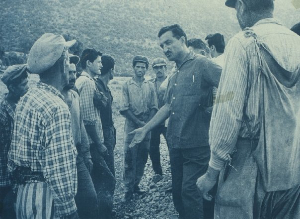Government's Struggle for Hegemony Fuels Doubts About the AKP's Democratic Values
By Orhan Bursali (vol. 2, no. 6 of the Turkey Analyst)
 Turkey’s ruling Justice and Development party (AKP) has won two consecutive elections and is now in its eighth year in power. Since the AKP’s leaders came from an Islamist political background, doubts about the sincerity of its adherence to the principles of the democratic system have lingered on among the opposition. These suspicions have been fed by the controversial policies of the AKP, and in particular by its sustained effort to concentrate power in the hands of the executive branch.
Turkey’s ruling Justice and Development party (AKP) has won two consecutive elections and is now in its eighth year in power. Since the AKP’s leaders came from an Islamist political background, doubts about the sincerity of its adherence to the principles of the democratic system have lingered on among the opposition. These suspicions have been fed by the controversial policies of the AKP, and in particular by its sustained effort to concentrate power in the hands of the executive branch.
Turkish Liberals Disenchanted With AKP, But Soul-Searching Has Yet to Come
By Halil M. Karaveli (vol. 1, no. 20 of the Turkey Analyst)
Turkey’s influential liberal intellectuals have become disenchanted with the ruling AKP, which they accuse of having abandoned its initial, reformist agenda. However, disappointed liberals have yet to acknowledge that events could have taken a different turn if they had chosen to exert a corrective influence on their Islamic conservative allies in the AKP. Above all, liberals who truly aspire to be a vanguard of freedom will have to revisit the question of secularism and its democratic implications.
The CHP Congress, Leadership Cults, and Turkish Democracy
By the Editors (vol. 1, no. 6 of the Turkey Analyst)
The recent congress of the Republican People’s Party saw the re-election of the party’s increasingly authoritarian leader, Deniz Baykal. A fixture of the political scene who has stayed at the helm after every election he lost, Baykal epitomizes one of the most serious problems of Turkey’s democracy: the dictatorial rule of party chiefs, which prevents both the institutionalization of political parties and healthy policy discussion within them. For this problems to be addressed, both changes in legislation and in political culture will be needed.
Challenging Times For Turkey's Democracy
By the Editors (vol. 1, no. 3 of the Turkey Analyst)
Turkey’s regime crisis, ongoing since 2007, has reached an unprecedented, dangerous level. If not checked, it could threaten recent advances in Turkish democracy. Indeed, the Turkish state itself shows signs of breaking up into confrontation along ideological lines. Turkey is adrift, putting extra strain on the country’s partners, the European Union and the United States. They need to reexamine their assumptions about the character of the Turkish crisis and its protagonists, and draw policy conclusions that will serve theirs and Turkey’s interests in the long term.
Turkey’s Social Democrats Need to Rediscover the Working Class
By Halil Karaveli (vol. 7, no. 9 of the Turkey Analyst)
Many recognize that the Turkish social democrats, the Republican People’s Party (CHP), need to broaden their appeal. The CHP has long defined its mission as protecting the secular, bourgeois lifestyle. Lately, it has tried to appear more conservative and pro-Islamic. The party assumes that identity politics trumps class politics. However, the successes of the AKP show this assumption to be wrong. The CHP could emulate the example of the AKP and build a coalition of bourgeois and working class interests. A modern social democracy would speak both for bourgeois interests – freedom, individual liberties and a culture that values innovation – and cater to the interests of the working and poor classes. There is no reason to assume that social democracy can never rise again. But first, the CHP needs to rediscover the working class.




